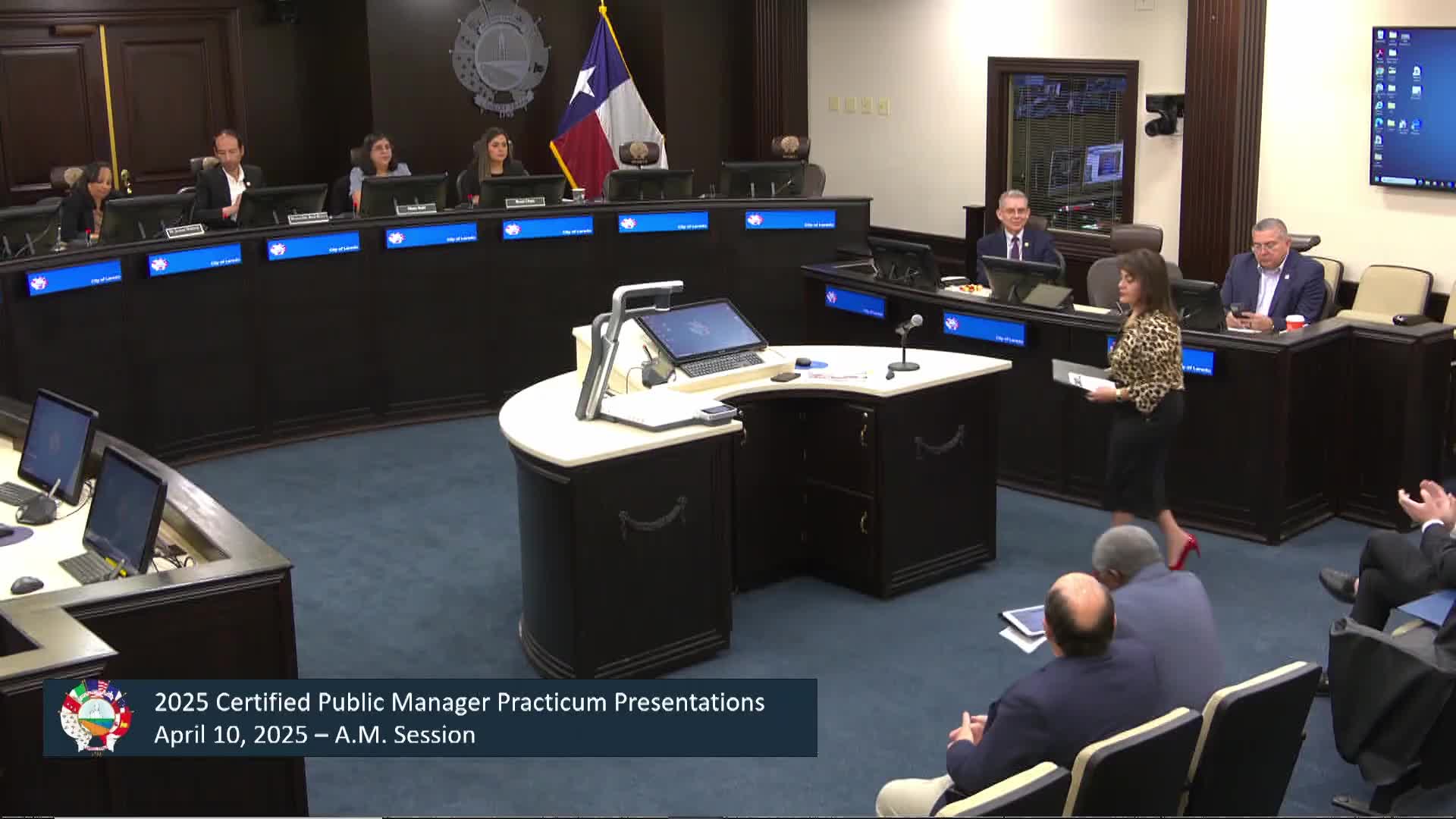City staff presents toll-rate study recommending per-axle increase to fund bridge expansions
September 27, 2025 | Laredo, Webb County, Texas
This article was created by AI summarizing key points discussed. AI makes mistakes, so for full details and context, please refer to the video of the full meeting. Please report any errors so we can fix them. Report an error »

Assistant Finance Director Ruby Solano presented a practicum at the City of Laredo CPM session recommending raised bridge tolls to fund planned expansion of the World Trade and Columbia international bridges.
Solano said the study is intended as an informational road map for the city to use when it is ready to act. "My practicum is gonna be in finding strategies and revenue sources to aid the fiscal health in Laredo. My focus is the potential increase of bridge toll rates," she said. She emphasized the analysis used actual 2024 figures rather than economic projections.
The study reviewed southbound toll revenue and traffic data for fiscal years 2021–2024 and compared Laredo rates with other Texas border ports of entry. Solano told the panel the city currently charges $1.75 per axle for noncommercial vehicles, $4.75 per axle for commercial trucks, and $1 for pedestrians. By resolution adopted in September 1998, 50% of toll revenues are transferred to the general fund, Solano said.
Solano reported the bridge capital program includes the World Trade Bridge expansion (additional eight northbound lanes and additional southbound lanes adjacent to the existing structure) and Columbia Bridge expansion (two new spans adding four lanes each). The expansions are not fully funded; Solano said unfunded capital needs tied to the Columbia Port of Entry and related work for the period 2026–2030 total about $150 million. Based on a financing scenario the city's advisers modeled, the estimated annual debt service on that issuance would be about $13 million, though Solano cautioned market conditions can change that figure.
To cover the debt service and preserve the 50% transfer to the general fund, Solano said her recommended scenario would raise noncommercial tolls by $1 per axle and commercial tolls by $1.25 per axle. Using 2024 traffic and revenue figures and the city's axle-based reporting, she said a $1 increase for noncommercial vehicles and $1.25 increase for commercial trucks would generate roughly $26.4 million in additional revenue; split per the 1998 resolution, that would leave about $13 million to apply to debt service and $13 million to support the general fund.
Solano and the panel discussed potential traffic impacts. Her literature review cited studies that found exchange rates, employment and industrial production explain most variation in binational bridge traffic and that modest toll increases often have only minimal impacts on large commercial traffic volumes. Solano also cited research estimating that border wait-time reductions — not toll changes — can generate large increases in cargo flows.
Panelists praised the report's use of local traffic data and comparisons with other ports but asked about timing, market sensitivity and public outreach. No formal motion or council action was recorded during the presentation; Solano characterized the study as background and a resource "for when the city is ready."
Solano said the study is intended as an informational road map for the city to use when it is ready to act. "My practicum is gonna be in finding strategies and revenue sources to aid the fiscal health in Laredo. My focus is the potential increase of bridge toll rates," she said. She emphasized the analysis used actual 2024 figures rather than economic projections.
The study reviewed southbound toll revenue and traffic data for fiscal years 2021–2024 and compared Laredo rates with other Texas border ports of entry. Solano told the panel the city currently charges $1.75 per axle for noncommercial vehicles, $4.75 per axle for commercial trucks, and $1 for pedestrians. By resolution adopted in September 1998, 50% of toll revenues are transferred to the general fund, Solano said.
Solano reported the bridge capital program includes the World Trade Bridge expansion (additional eight northbound lanes and additional southbound lanes adjacent to the existing structure) and Columbia Bridge expansion (two new spans adding four lanes each). The expansions are not fully funded; Solano said unfunded capital needs tied to the Columbia Port of Entry and related work for the period 2026–2030 total about $150 million. Based on a financing scenario the city's advisers modeled, the estimated annual debt service on that issuance would be about $13 million, though Solano cautioned market conditions can change that figure.
To cover the debt service and preserve the 50% transfer to the general fund, Solano said her recommended scenario would raise noncommercial tolls by $1 per axle and commercial tolls by $1.25 per axle. Using 2024 traffic and revenue figures and the city's axle-based reporting, she said a $1 increase for noncommercial vehicles and $1.25 increase for commercial trucks would generate roughly $26.4 million in additional revenue; split per the 1998 resolution, that would leave about $13 million to apply to debt service and $13 million to support the general fund.
Solano and the panel discussed potential traffic impacts. Her literature review cited studies that found exchange rates, employment and industrial production explain most variation in binational bridge traffic and that modest toll increases often have only minimal impacts on large commercial traffic volumes. Solano also cited research estimating that border wait-time reductions — not toll changes — can generate large increases in cargo flows.
Panelists praised the report's use of local traffic data and comparisons with other ports but asked about timing, market sensitivity and public outreach. No formal motion or council action was recorded during the presentation; Solano characterized the study as background and a resource "for when the city is ready."
View full meeting
This article is based on a recent meeting—watch the full video and explore the complete transcript for deeper insights into the discussion.
View full meeting
